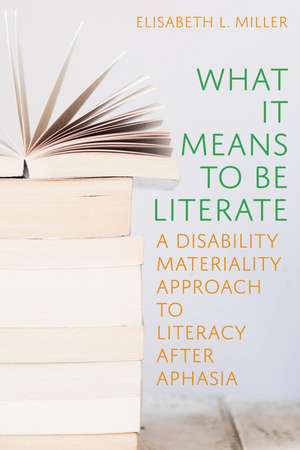What It Means to Be Literate: A Disability Materiality Approach to Literacy after Aphasia: Composition, Literacy, and Culture
Autor Elisabeth Milleren Limba Engleză Hardback – 6 dec 2022
Din seria Composition, Literacy, and Culture
-
 Preț: 426.79 lei
Preț: 426.79 lei -
 Preț: 430.66 lei
Preț: 430.66 lei -
 Preț: 426.79 lei
Preț: 426.79 lei -
 Preț: 390.71 lei
Preț: 390.71 lei -
 Preț: 139.00 lei
Preț: 139.00 lei -
 Preț: 425.86 lei
Preț: 425.86 lei -
 Preț: 388.79 lei
Preț: 388.79 lei -
 Preț: 388.79 lei
Preț: 388.79 lei -
 Preț: 348.83 lei
Preț: 348.83 lei -
 Preț: 210.43 lei
Preț: 210.43 lei -
 Preț: 199.10 lei
Preț: 199.10 lei -
 Preț: 181.71 lei
Preț: 181.71 lei -
 Preț: 422.97 lei
Preț: 422.97 lei -
 Preț: 388.79 lei
Preț: 388.79 lei -
 Preț: 394.57 lei
Preț: 394.57 lei -
 Preț: 386.88 lei
Preț: 386.88 lei -
 Preț: 362.33 lei
Preț: 362.33 lei -
 Preț: 446.05 lei
Preț: 446.05 lei -
 Preț: 390.71 lei
Preț: 390.71 lei -
 Preț: 391.67 lei
Preț: 391.67 lei -
 Preț: 383.01 lei
Preț: 383.01 lei -
 Preț: 358.46 lei
Preț: 358.46 lei -
 Preț: 197.45 lei
Preț: 197.45 lei -
 Preț: 388.79 lei
Preț: 388.79 lei -
 Preț: 359.07 lei
Preț: 359.07 lei -
 Preț: 349.99 lei
Preț: 349.99 lei -
 Preț: 356.55 lei
Preț: 356.55 lei -
 Preț: 387.82 lei
Preț: 387.82 lei -
 Preț: 360.37 lei
Preț: 360.37 lei -
 Preț: 392.66 lei
Preț: 392.66 lei -
 Preț: 425.86 lei
Preț: 425.86 lei -
 Preț: 424.88 lei
Preț: 424.88 lei -
 Preț: 391.67 lei
Preț: 391.67 lei -
 Preț: 386.88 lei
Preț: 386.88 lei -
 Preț: 348.83 lei
Preț: 348.83 lei -
 Preț: 386.88 lei
Preț: 386.88 lei -
 Preț: 389.38 lei
Preț: 389.38 lei -
 Preț: 385.91 lei
Preț: 385.91 lei -
 Preț: 384.92 lei
Preț: 384.92 lei -
 Preț: 385.91 lei
Preț: 385.91 lei -
 Preț: 384.00 lei
Preț: 384.00 lei -
 Preț: 426.79 lei
Preț: 426.79 lei -
 Preț: 426.79 lei
Preț: 426.79 lei -
 Preț: 350.79 lei
Preț: 350.79 lei -
 Preț: 386.88 lei
Preț: 386.88 lei -
 Preț: 350.79 lei
Preț: 350.79 lei -
 Preț: 383.01 lei
Preț: 383.01 lei -
 Preț: 350.79 lei
Preț: 350.79 lei -
 Preț: 385.91 lei
Preț: 385.91 lei
Preț: 388.79 lei
Nou
Puncte Express: 583
Preț estimativ în valută:
74.39€ • 77.67$ • 61.57£
74.39€ • 77.67$ • 61.57£
Carte disponibilă
Livrare economică 14-28 martie
Preluare comenzi: 021 569.72.76
Specificații
ISBN-13: 9780822947233
ISBN-10: 0822947234
Pagini: 188
Dimensiuni: 140 x 216 x 23 mm
Greutate: 0.43 kg
Editura: University of Pittsburgh Press
Colecția University of Pittsburgh Press
Seria Composition, Literacy, and Culture
ISBN-10: 0822947234
Pagini: 188
Dimensiuni: 140 x 216 x 23 mm
Greutate: 0.43 kg
Editura: University of Pittsburgh Press
Colecția University of Pittsburgh Press
Seria Composition, Literacy, and Culture
Recenzii
“In What It Means to Be Literate, Elisabeth L. Miller challenges long-held assumptions about the relationship between embodiment, literacy, and disability as she takes a disability materiality look at literate practices navigated by people experiencing aphasia. In helping us listen to stories about literacy, she also pushes readers to recognize the layers of stigma and ableism that are part of everyday literacy experiences, but which are not always readily recognized in combination. This is a necessary read for anyone interested in literacy studies or disability studies for understanding the complex interrelationships between literacy and disability.” —Stephanie Kerschbaum, University of Washington
“This manuscript has the potential to be a classic, in the sense that, even though we teach about literacy inexhaustibly in writing, rhetoric, and composition classrooms at all levels, we don’t have much good material to understand how people with disabilities shape new literate possibilities around a series of barriers and false boundaries. And because anyone who gets constructed as less literate or illiterate is also—en route—constructed as disabled; and because disabled people have traditionally built their own rich literacies within their relationships, cultures, and communities; and because we all need to do this work on an ongoing basis, adapting and altering our literacies—for all of these reasons everyone needs to care deeply about the relationship of disability and literacy.” —Jay Dolmage, University of Waterloo
“This manuscript has the potential to be a classic, in the sense that, even though we teach about literacy inexhaustibly in writing, rhetoric, and composition classrooms at all levels, we don’t have much good material to understand how people with disabilities shape new literate possibilities around a series of barriers and false boundaries. And because anyone who gets constructed as less literate or illiterate is also—en route—constructed as disabled; and because disabled people have traditionally built their own rich literacies within their relationships, cultures, and communities; and because we all need to do this work on an ongoing basis, adapting and altering our literacies—for all of these reasons everyone needs to care deeply about the relationship of disability and literacy.” —Jay Dolmage, University of Waterloo
Notă biografică
Elisabeth L. Miller is assistant professor of English and director of the Writing and Speaking in the Disciplines Program at University of Nevada, Reno. She researches and teaches about literacy, disability, and writing across the curriculum.
